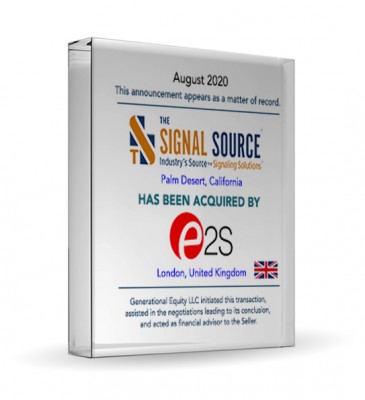
How To Sell A Manufacturing-Related Business
By Generational Equity
09/23/2013
The sale of every privately held business is an adventure that requires skill, determination, and patience. And, if you are marketing your business without professional help, you will need to continue the successful operation of your company while looking for and negotiating with buyers. Because of this we highly recommend the use of a professional M&A advisory firm to close your transaction.
However, because we know that this is not possible for every business owner to afford, today we begin a series of “how to” articles on key issues to be aware of when selling a specific type of company. Our first in this series will focus on how to sell a manufacturing business.
As you may be aware, over the last few years in many parts of the country manufacturing has begun to show signs of a revival. “On-shoring” has become popular as companies recalibrate their business plans in the light of rising labor costs overseas, coupled with increased shipping costs and ongoing quality control issues.
These circumstances are making manufacturing businesses in North America very attractive. This is good news for owners of privately held companies; however, to find an optimal buyer who will pay a premium for your business, you need to still do your homework and prepare your business to be “buyer ready.”
Step 1: Write It Down
The first step before you begin to engage with buyers to sell your manufacturing business is to make sure you have documented in writing what you do and how you do it. Too often we engage with business owners who have great businesses, but the steps they use to manufacture their products are either between the ears of the owner and/or key employees, or if written down at all, the manuals are very slim and loosely constructed.
A buyer will want to ensure that the company will continue to function smoothly if you and/or key employees depart post-acquisition. The more you can document your processes/procedures BEFORE entering the market, the better off you will be when buyers begin to closely examine your business during due diligence.
Step 2: Clean Up
You only get one chance to make a first impression, so you need to clean up the shop floor. You would be amazed at how many owners never lift a finger cosmetically before they start conducting company tours with buyers. Business buyers, especially buyers of manufacturing entities, are quite concerned when they visit facilities that are not in the best of shape.
Even though you may know where everything is and you know where to step to avoid injury, buyers will not. So take some time before you ever invite a potential buyer over and clean your facility. You may be surprised what you might find.
Step 3: Be Compliant With Environmental Laws
Where are you dumping that goo? You must ensure that you are environmentally compliant. This is especially vital if you are in an industry that involves the removal of toxic materials after the production process is over.
Make sure that the person in charge of toxin removal has been not only clearly following the rules but keeping detailed records of the legal removal of the offending materials. If you find that you are not in complete compliance, spend the money to rectify the situation. Even though it may cost more now to use the authorized removal organization for your output, it will cost you even more if you are required by a buyer to indemnify them of any wrongdoing post-closing.
Simply put, make sure your organization is squeaky clean from an environmental compliance standpoint.
More Action
These are just a few steps you can take before approaching buyers to make your manufacturing business as buyer ready as possible. Time and space do not allow me to delve into this topic further.
The key issue to keep in mind is that buyers analyze the perceived risk involved in making any acquisition. Naturally, if they are looking at two similar investment options, the one with the least risk, more often than not, will be the one that they choose. The more steps you can take now to minimize the perceived risk in your business, the better positioned you will be when buyers begin to examine your company.
To learn more about this critical topic I invite you to visit our research library and download our whitepapers that cover a number of related topics. If you have more questions after that, then attending a Generational Equity M&A workshop would be helpful. You can learn more by visiting our website.
Bottom line: If you own a manufacturing business, analyze its operations as if you were a buyer. Ask yourself, what are the risks of this business? What would a buyer be concerned about during due diligence, and what can I do now before entering the market to minimize those risks?
Carl Doerksen is the Director of Corporate Development at Generational Equity.
© 2021 Generational Equity, LLC All Rights Reserved



